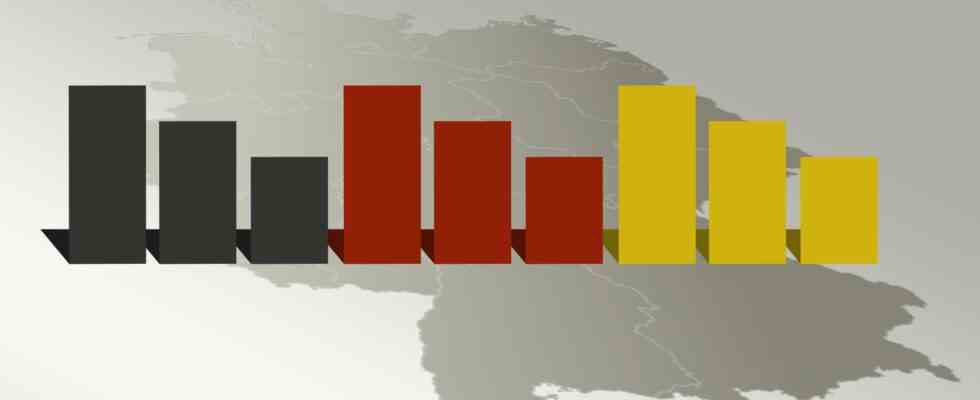Status: 03/03/2022 5:59 p.m
Arms deliveries and higher defense spending – the change of course in security policy is getting noisy ARD Germany trend majority support. The war in Ukraine causes people various concerns.
With regard to the war in Ukraine, Germans are primarily concerned about the local people: 89 percent are very or very worried about the Ukrainians.
Almost one in eight (77 percent) is afraid that Ukraine will be completely occupied and a good two-thirds (69 percent) express concern that there will be another major war in Europe. This was the result of a representative survey by infratest dimap for the ARD Germany trend.
Great support for measures against Russia
53 percent of those surveyed rated the German government’s reaction to the situation in Ukraine as appropriate, a good quarter did not go far enough and for 14 percent they went too far.
Among the party supporters, only the supporters of the AfD hold the majority view that German politicians have reacted excessively. The individual measures in which Germany was involved also met with approval from the general public – most notably the exclusion of important Russian banks from SWIFT international payment transactions (82 percent), but also the suspension of the approval process for the Russian natural gas pipeline NordStream 2 ( 67 percent).
A majority of people also expressed concern that the economic situation in Germany could deteriorate or that there could be bottlenecks in the energy supply. But around two-thirds of those surveyed said they would support measures against Russia even if there were such energy shortages or higher living costs.
Change of mood in arms deliveries
The Russian invasion of Ukraine has led to a repositioning of Germany in terms of security policy, which obviously supports a majority of the German population. The transfer of additional Bundeswehr units to Eastern European NATO countries (68 percent) is welcomed. 65 percent also say taking out a loan of 100 billion euros to buy modern weapons for the Bundeswehr is the right thing to do.
Germans are divided on whether the federal government has delayed military aid for Kyiv for too long: 45 percent agree, 46 percent disagree.
At the beginning of February, only 20 percent of those surveyed said that Germany should supply arms to Ukraine. With the Russian invasion, this assessment has apparently changed completely: The arms deliveries are now receiving approval from 61 percent.
Seven out of ten Germans also think it is right that Germany’s annual defense tasks should be increased to at least two percent of gross domestic product in the coming years. The majority of supporters say that their attitude has changed as a result of the Russian invasion.
19 percent think the planned increase in defense spending is wrong. The supporters of the Union, FDP and SPD signaled the greatest support for the planned increases in spending. The supporters of the AfD and the left are divided on the question.
Approval for Ukraine’s EU accession
Earlier this week, Ukrainian President Volodymyr Zelenskyy called for his country to join the EU immediately. EU Commission President Ursula von der Leyen then reiterated that she sees Ukraine as part of the European Union in the long term.
The majority of Germans (63 percent) also believe that Ukraine should be admitted to the European Union in the long term. The perception of Ukraine has also changed abruptly among Germans in the current crisis. With the current unstable situation in the country, a majority (63 percent) see Ukraine as a partner they can trust. That is 33 percentage points more than in January.
At the same time, the reputation of Russia among Germans has fallen to a low. Just 6 percent currently see Russia as a trustworthy partner for Germany (-11). In the current security policy crisis, Germany’s relationship with NATO appears to be solid. 83 percent underline the importance of the military alliance for peace in Europe these days.
In retrospect, however, the invasion of Ukraine caused many to doubt Germany’s Russia policy to date. Two-thirds (68 percent) are of the opinion that Germany has been too lenient towards Vladimir Putin in recent years.
Satisfaction with the federal government increases
With its current actions in the Ukraine crisis, the federal government has apparently regained the trust of the Germans. Currently, 56 percent of eligible voters are satisfied with the work of the coalition (+18 compared to February). 41 percent are dissatisfied with it. This is also reflected in the clear gains in popularity of the coalition leaders.
If there were a federal election on Sunday, the SPD would get 25 percent (+3). The CDU/CSU would come to 26 percent (-1) and would thus be just about the strongest force. As in the previous month, the Greens reached 16 percent in the Sunday question. The FDP loses one percentage point and would come to 9 percent. The AfD also loses one percentage point and ends up at 11 percent. As in the previous month, the left would reach 5 percent. All other parties accounted for 8 percent of the votes.
investigation facility
Universe: Eligible voters in Germany
Collection method: Random telephone* and online survey
*of which 60 percent landline, 40 percent mobile
Survey period: February 28 to March 02, 2022
number of cases: 1,320 respondents (863 telephone interviews and 457 online interviews)
Weighting: according to sociodemographic characteristics and
Voting behavior recall
fluctuation range: 2* to 3** percentage points
* with a share value of 10 percent ** with a share value of 50 percent
Implementing institute: infratest dimap
Results are rounded to whole percentages to avoid false expectations of precision. Because for all representative surveys, fluctuation ranges must be taken into account. In the case of a survey with 1000 respondents, these amount to around three percentage points for large parties and around one point for smaller parties. In addition, the rounding error is significant for small parties. For these reasons, no party below three percent is shown in the Sunday question.

